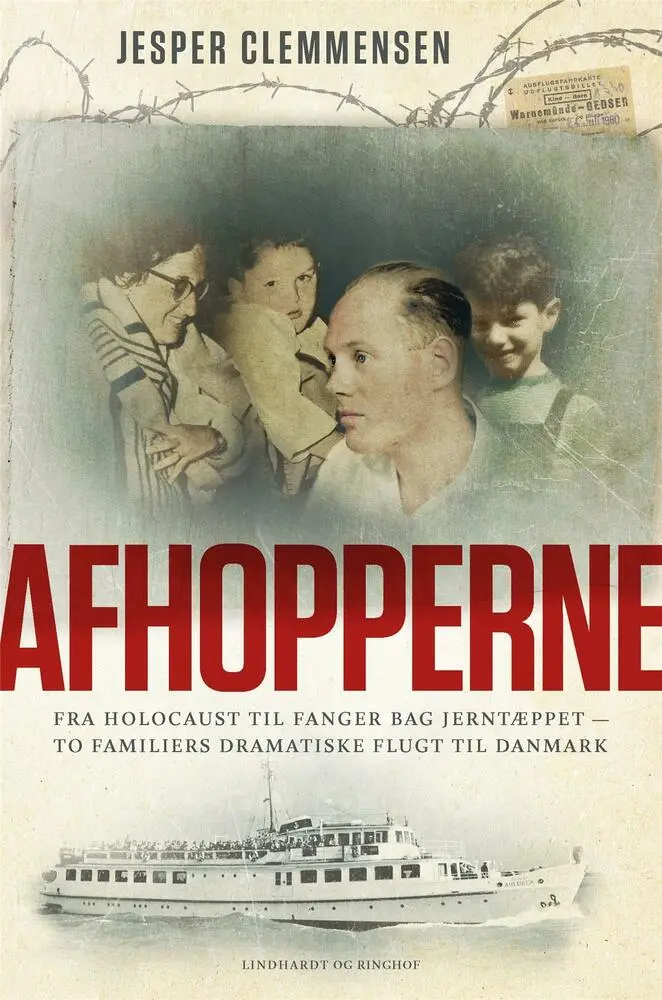Afhopperne
Forlagsbeskrivelse af Afhopperne af Jesper Clemmensen
Detaljer
Bogens kategorier Klik på en kategori for at se lignende bøger
Anmeldelser Afhopperne
Brugernes anmeldelser
A review of a book that tells the tale of how two Czech families survived the holocaust and escaped communists oppression. 42 years ago in Cargese on the island of Corsica I met a fellow PhD student at a NATO summer school in theoretical physics. His name is Martin Rocek and he immediately told me how he survived a gas explosion at the European accelerator centre CERN a few years earlier. Only a little later he related the story of how his family jumped off (literally) from communist Czechoslovakia in 1960, jumping from a boat in the Danish harbour of Gedser. Later on I also learnt that his mother Eva, grandmother Anna and father Jan, who jumped together with young Martin and his brother Tom, were survivors from concentration camps. I felt then and have often felt since that a book ought to be written relating this whole fascinating family story. Now, sixty years after the event this book is finally written. The book so far only exists in Danish, but a Czech and a Swedish translation and, tentatively, an English one are under way. The title is “Afhopperne” (those who jumped off or the defectors) and the author is the Danish journalist Jesper Clemmensen. It has to be said directly that he has done an excellent job. We are introduced to the Rocek family when in Prag a 95 years old Jan attends the ceremony of inserting three “stumble stones” in the pavement in front of what was once his old family home in Prag: One stone with his father’s name on a copper plate, one with his mother’s and one with his sister’s. They were all deported in 1942 and murdered in in 1944. The nearest to a funeral he gets, says the ageing Jan. The book then takes us back to paint the background of the Jan Rocek’s family in early 20th century Czechoslovakia, as well as that of his wife Eva Porges’ . We are also given the background of Arnost Reiser and his wife to be Ruth Freund. The Reisers were good friends of the Roceks and jumped of from the same ship in the Gedser harbour the next day. After the Prag background, we are taken on a tour through the German occupation of Czechoslovakia and the ensuing antisemitism, the unimaginable horrors of the concentration camps Theresienstadt, where Jan and Eva first meet, and Auschwitz, where their family were murdered, the miraculous survival of the death marches both by Jan and, separately, by Eva and her mother. They are then reunited in a Prag recently rid of the Nazis and breathing optimism. The optimism soon vanishes however, as it becomes clear that the country is under Soviet influence as is finally manifested by the Czech communist coup in 1948. A familiar pattern of antisemitism and lack of freedom ensues. Ten years later, in 1957, Jan has become a well established Chemist and by chance manages to visit Oxford, Cambridge and Glasgow on a research trip. The contrast of what he sees there to what he had been told by the communist propaganda overwhelms him. From then on he decides that he and his family, now including the two boys, must get away from the East. This is imperative for to give the boys a good future. The book now describes the difficulties in getting out of Czechoslovakia facing people who want to do this in that era. The obstacles and prospects of death or being sent to a labour camp were overwhelming. The final part of the book describes how the Roceks and the Reisers managed to escape when on a road trip by car through DDR. Although the reader knows the final outcome, the author manages to make this chapter full of drama and suspense. There was a lot of luck and desperation involved when the families boarded the ship Seebad Ahlbeck in Warnemünde one day after each other and jumped into the Gedser harbour on arrival there. There is a Danish hero that dived in to help them and whose identity was only recently found out. His daughter was in the small Prag gathering inserting the stumble stones. Since Martin grew up to become a theoretical physicists, it is interesting to note that the great Niels Bohr wrote a letter on Jan’s behalf when Jan was still being interrogated in Denmark. This is a piece of contemporary history, written as a personal tale of two families, which illustrates parts of the 20th century better than any history book. Ulf Lindström Professor of Theoretical Physics Uppsala University and Imperial College /“Afhopperne”, Jens Clemmenssen, Lindhart and Ringhof, 2020/
